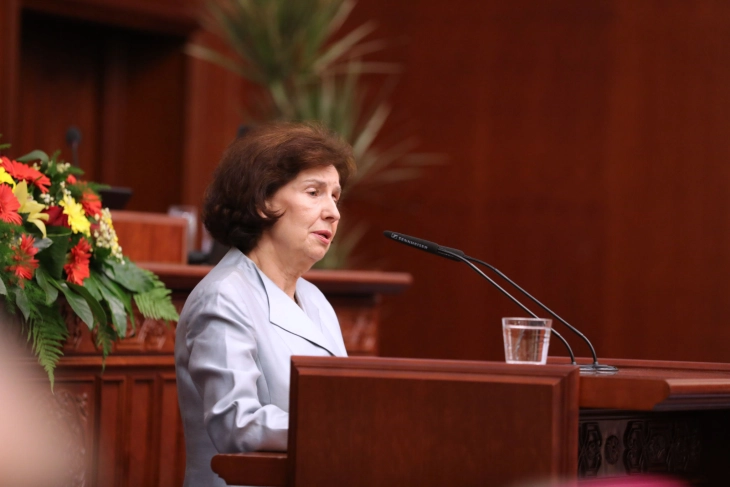Politico: Siljanovska-Davkova triggers spat with Greece even before sworn in
- North Macedonia’s newly elected nationalist president hadn’t even been sworn in on Sunday before triggering a diplomatic spat with neighboring Greece, according to Brussels news portal Politico in an article published on Sunday evening.
- Post By Magdalena Reed
- 11:28, 13 May, 2024

Skopje, 13 May 2024 (MIA) — North Macedonia’s newly elected nationalist president hadn’t even been sworn in on Sunday before triggering a diplomatic spat with neighboring Greece, according to Brussels news portal Politico in an article published on Sunday evening.
"During the swearing-in ceremony in the country’s parliament, Gordana Siljanovska-Davkova, who is the young nation’s first female president, referred to her country as 'Macedonia' rather than by its constitutional name, 'North Macedonia'," Politico wrote.
"Greece’s ambassador to Skopje, Sophia Philippidou, immediately left the inauguration ceremony in protest," it noted, adding that Greece’s Foreign Ministry also issued a statement saying the new president’s words had violated the terms of the 2018 international Prespa Agreement between Athens and Skopje, and had endangered both bilateral relations and North Macedonia’s prospects of joining the European Union.
Under the historic Prespa deal, the portal recalled, the country’s name and constitution were changed, allowing North Macedonia to join NATO in 2020 and start its EU accession process.
It also quoted European Commission President Ursula von der Leyen posting on X that for North Macedonia to continue its successful path to EU accession, it was paramount the country continue its reforms and fully honor binding agreements, including the Prespa Agreement.
Politico also recalled that Greece had blocked North Macedonia’s EU and NATO accession for decades, alleging that by calling itself “Macedonia,” its Balkan neighbor was appropriating a Greek name as well as the history of the ancient Greek Kingdom of Macedonia.
"For the past two years, Bulgaria has also blocked North Macedonia’s EU bid, demanding its constitution be amended once again to acknowledge the country’s Bulgarian minority," the portal added.
"The Prespa Agreement was signed by the government at the time, led by the socialist SDSM party," it said, adding that, by contrast, the nationalist VMRO-DPMNE, to which Siljanovska-Davkova belongs, has always bucked the deal.
The Politico article also pointed out that during his campaign for last week’s parliamentary election, VMRO-DPMNE leader Hristijan Mickoski accused SDSM of having made "humiliating compromises" to settle disputes with national neighbors and continued to call the country Macedonia despite the Prespa agreement.
“For me, Macedonia is and will remain Macedonia,” Politico cited Mickoski as repeating.
VMRO-DPMNE, the portal said, now returned to power after seven years, having secured big wins in parliamentary and presidential elections last week.
"Its results are expected to further complicate relations with both Greece and Bulgaria, not to mention the country’s EU accession path," the portal wrote, noting that although VMRO-DPMNE said it supported EU membership, it said it would not agree to the constitutional changes demanded by Bulgaria, a pre-condition for the country’s accession to the bloc.
Politico also noted that in Greece, the left-wing Syriza opposition party had condemned Siljanovska-Davkova’s use of the term Macedonia and called on the country’s government “to abandon this passive stance” and to mobilize “all available diplomatic means at international and European level” to address “with severity … any use of terms or actions by the new president and members of the new government of North Macedonia that violate the Prespa Agreement.” mr/







